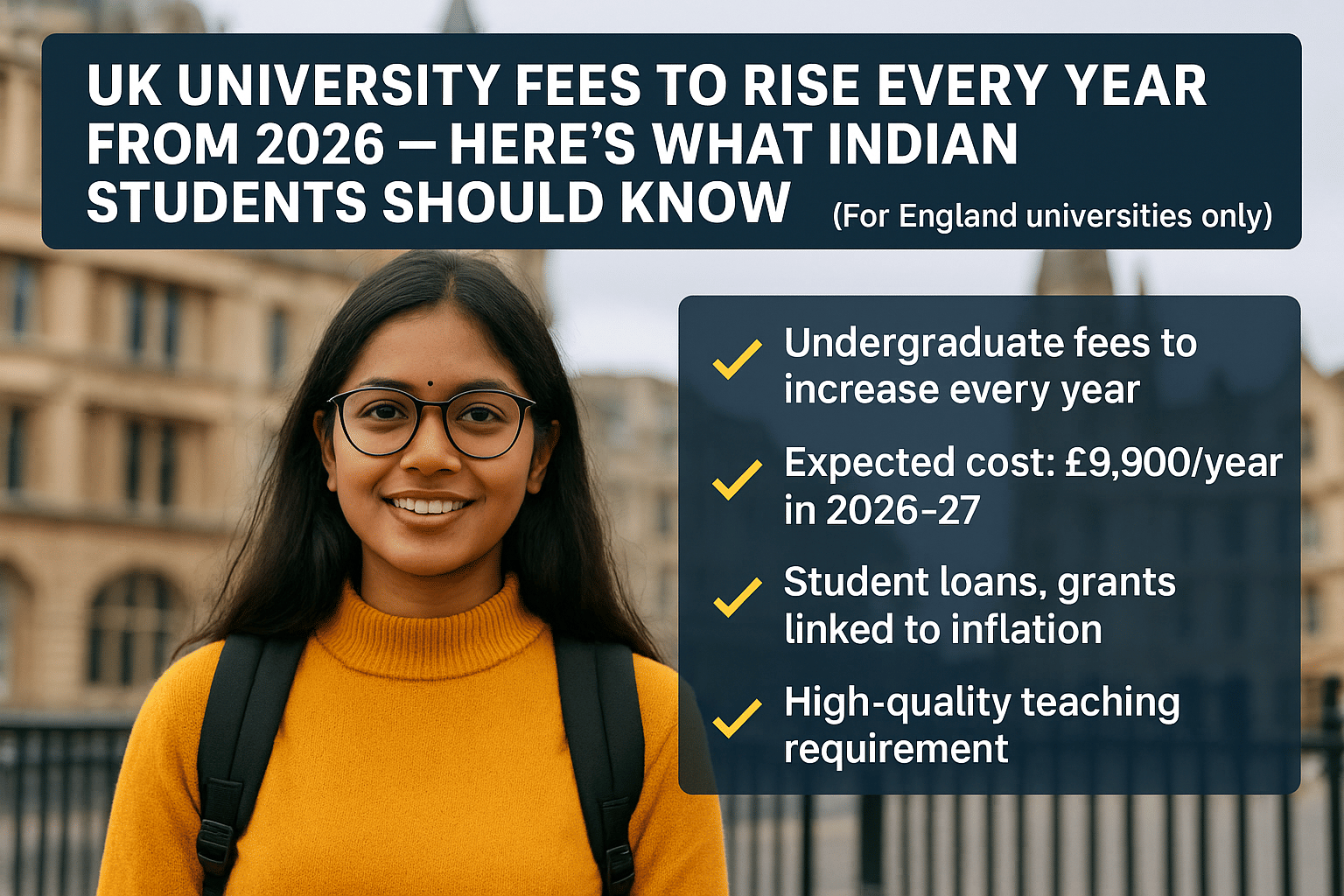Jasmine Grover Content Strategy Manager
Content Strategy Manager | Updated On - Oct 25, 2025
If you’re planning to study in the UK soon, be prepared for higher university costs. The UK government has confirmed that tuition fees in England will rise every year starting from 2026, in line with inflation rates.
This means the annual tuition cap — currently £9,535 (around ₹10 lakh) — could go up to about £9,900 (₹10.4 lakh) in 2026–27, depending on how inflation moves.

Latest Study in UK News for Indian Students
- UK Tightens Visa and English Language Rules: Students and Workers Face Higher Standards from 2026
- UK Graduate Route Cut to 18 Months from January 2027; Higher Funds and English Standards to Follow
- UK Expands High Potential Individual (HPI) Visa
What Will Change from 2026?
- Tuition fees will rise with inflation for the academic years 2026-27 and 2027-28.
- Education Secretary Bridget Phillipson announced that from 2026 onwards, tuition fees and maintenance loans will automatically adjust based on inflation.
- The current annual cap of £9,535 could increase to around £9,900 in 2026-27, depending on inflation.
- The policy applies only to universities in England, not in Scotland, Wales, or Northern Ireland.
This marks the first time in nearly a decade that UK university fees will rise regularly, after being frozen for several years.
Why Is the Government Increasing Fees?
According to the Department for Education (DfE), the plan aims to “restore financial sustainability” to universities. Years of frozen fees have led to serious cost pressures — a recent Office for Students (OfS) report warned that 43% of UK universities are at risk of deficit for the third consecutive year, especially after fewer international students enrolled this year.
Universities UK, the national body representing 141 institutions, called the decision “a much-needed reset”, noting that many campuses are still recovering from post-Brexit and pandemic-related challenges. University experts say the change will help keep campuses running smoothly and maintain teaching quality.
However, student unions have criticized the move, saying it could make studying abroad less affordable for international students — especially those from India.
The Bigger Picture: Struggling Universities and Fewer International Students
The timing of this announcement follows a year of financial turbulence in higher education. The OfS report attributes much of the strain to a sharp decline in international student enrolments after the UK tightened visa and financial proof requirements and shortened post-study work rights under the Graduate Route.
International students, who contribute billions annually in tuition and living expenses, have historically helped offset domestic funding gaps.
The loss of international revenue, combined with rising costs, has left many universities operating with narrow margins or cutting staff and programs.
Impact on Students and Loans
The government has also said that:
- Student loans and maintenance support will increase in line with inflation, helping offset higher fees.
- New maintenance grants will return by 2029 for students from lower-income households.
- These grants will be funded partly by a tax on international student fees — meaning more support for students who need it most.
What It Means for Indian Students?
For Indian students, this change could slightly increase the total cost of studying in the UK, especially when combined with:
- Higher visa and living cost requirements (already announced for 2025)
- A shorter Graduate Route stay (now 18 months from 2027)
- Ongoing housing and cost-of-living pressures
Still, experts say the UK remains one of the most popular and trusted destinations for Indian students, thanks to:
- Globally recognized universities
- Strong career opportunities
- Post-study work options
So while the costs are going up, UK degrees will continue to hold strong global value.
Quality Standards and Fee Caps
Under the proposed system, universities will only be allowed to charge the full fee if they meet “high-quality teaching thresholds” set by the OfS.
Institutions that fail to meet these benchmarks may face reduced tuition caps, effectively linking teaching quality with revenue.
Education Secretary Phillipson described this as a “challenge to drive out low-quality provision.”
Critics, however, warn that it could lead to a two-tier university system, where wealthier students choose top-rated institutions, leaving others underfunded.
The Introduction of V-Levels
Alongside tuition reforms, the government announced the rollout of V-Levels from 2027, a new category of Level 3 vocational qualifications that will replace many existing BTecs.
V-Levels will sit alongside A-Levels and T-Levels, offering pathways in engineering, creative arts, agriculture, and digital technology.
The reform aims to simplify over 900 existing qualifications and create “clearer routes from school to skilled employment.”
Key Takeaways
- Tuition fees in England to rise annually from 2026, linked to inflation.
- Expected increase: up to £9,900 in 2026-27 (based on current inflation).
- Universities must meet OfS quality thresholds to charge full fees.
- Maintenance loans and grants will rise for students from lower-income families.
- V-Levels to be introduced from 2027 to modernize vocational education.
- Experts say the policy may stabilize finances but increase debt for future graduates.



Comments